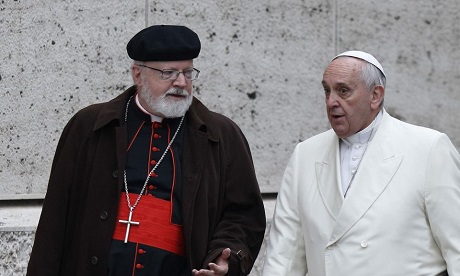Protocols are needed to hold bishops accountable for sex abuse, says Cardinal Sean O’Malley of Boston.
Numerous accusations of sexual abuse of minors and adults have arisen against former Archbishop of Washington, Cardinal Theodore McCarrick.
O’Malley acknowledged “a credible and substantiated allegation” involving a minor and McCarrick when the prelate was a priest in the New York diocese.
He also acknowledged the diocese’s investigation of a second incident also involving a minor and McCarrick.
“These cases and others require more than apologies,” O’Malley says.
“They raise up the fact that when charges are brought regarding a bishop or a cardinal, a major gap still exists in the Church’s policies on sexual conduct and sexual abuse.”
O’Malley says while the Church in the United States has adopted a zero tolerance policy regarding the sexual abuse of minors by priests, clearer procedures for cases involving bishops are needed.
“Transparent and consistent protocols are needed to provide justice for the victims and to adequately respond to the legitimate indignation of the community.
“The Church needs a strong and comprehensive policy to address bishops’ violations of the vows of celibacy in cases of the criminal abuse of minors and in cases involving adults.”
O’Malley says he has formed these opinions after working in several dioceses and with the Pontifical Commission for the Protection of Minors.
“The Church needs to swiftly and decisively take action regarding these matters of critical importance,” he says.
“In every instance of claims made by victims of sexual abuse, whether criminal violations or the abuse of power, the primary concern must be for the victim, their family and their loved ones.
“The victims are to be commended for bringing to light their tragic experience and must be treated with respect and dignity.”
The accusations “are understandably a source of great disappointment and anger for many,” Cardinal O’Malley says.
O’Malley says three actions are now required of the Church. These involve:
• a fair and rapid adjudication of these accusations
• an assessment of the adequacy of the Church’s standards and policies at every level, and especially in the case of bishops
• communicating more clearly to the Catholic faithful and to all victims the process for reporting allegations against bishops and cardinals.
“Failure to take these actions will threaten and endanger the already weakened moral authority of the Church and can destroy the trust required for the Church to minister to Catholics and have a meaningful role in the wider civil society,” O’Malley says.
“In this moment there is no greater imperative for the Church than to hold itself accountable to address these matters, which I will bring to my upcoming meetings with the Holy See with great urgency and concern.”
Source
